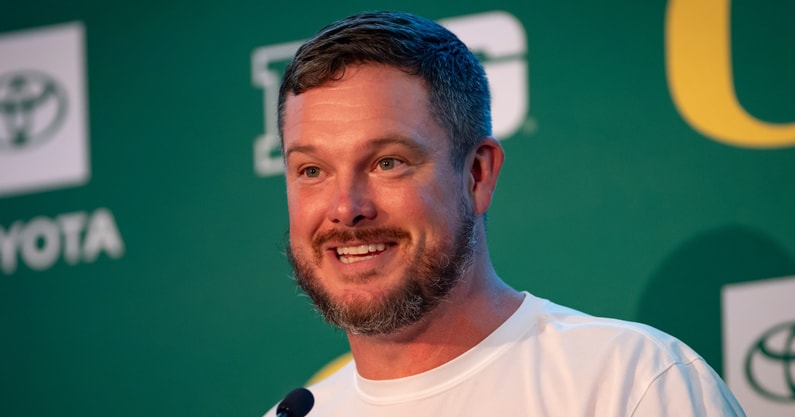Dan Lanning weighs idea of athletes as employees, how to distribute NIL dollars

Through the early weeks of the revenue-sharing era in college athletics, the idea of athlete employment continues to come up. Collective bargaining and employment are seen as some of the next big questions in the post-House settlement landscape.
Oregon head coach Dan Lanning said he has thoughts about potentially making athletes employees. But he didn’t share them in full, citing the need to consider the consequences of such an action. It’s something he said is important when implementing any rule.
Lanning weighed the idea of employment and distributing NIL dollars as he gets ready for his fourth season at Oregon. He understands some of the positives that could come with athlete employment, but he also pointed out there are other factors he doesn’t know about that could impact that move.
“What I think we do a lot in college football in general is we create a rule, and then we don’t always think about what the consequences of that rule [are] and we have to deal with the pieces of that later,” Lanning told CBS’ Jenny Dell. “So not knowing enough information, is there a lot of merit for having these guys as employees? Yes. But there’s probably something that I’m not thinking about that goes along with that that really matters, too.
“… You can’t put the toothpaste back in the tube. And that’s what happens when we continue to create new rules and figure out the consequences later.”
NCAA legal battles – particularly around eligibility rules – and the rev-share era have brought about the idea of collective bargaining. With that, athlete employment also comes up. However, President Donald Trump issued an executive order that clarified athletes are not employees. The SCORE Act in the U.S. House of Representatives would also protect them from employment status.
‘It starts with finding guys that love ball’
NCAA leadership has been seeking federal help to settle the landscape since the NIL era officially began in 2021. Trump’s executive order also included a crackdown on “pay-for-play” from third parties as the dollars continue to flow, especially in college football.
When it comes to conversations about divvying up dollars, Dan Lanning argued it’s not much different than shopping for a car. If there’s a better deal to be had, he said players are going to take it if they can. But he made it clear NIL shouldn’t be the only consideration in recruitment.
“I think first, it starts with finding guys that love ball and that’s not the only thing that’s the motivating factor,” Lanning said. “The other piece that I think fans have to realize is, players are no different than us if we went to go buy a car and at this place, the car is $10,000 less and this place is $10,000 more, you’re going to take the better deal. There’s a reality to it, too, that exists. If you’ve got great options, that’s certainly a piece of the puzzle.
Top 10
- 1New
JP Poll Top 20
Big shakeup after Week 2
- 2
Heisman Odds shakeup
Big movement among favorites
- 3Hot
Eli Drinkwitz comes clean
Knew rule was broken
- 4
Deion Sanders
Fires back at media
- 5Trending
Big 12 punishes ref crew
Costly mistake in Kansas-Mizzou
Get the Daily On3 Newsletter in your inbox every morning
By clicking "Subscribe to Newsletter", I agree to On3's Privacy Notice, Terms, and use of my personal information described therein.
“What’s important for me is, when guys walk in the room, just because you’re taken care of or you might be able to do some things differently than we did when we went to college, that doesn’t mean you shouldn’t still have a chip on your shoulder. And if you love football and you want to be the best, that’s going to be more fuel for you intrinsically than anything you can get extrinsically.”
Dan Lanning: ‘Just be ready to adapt’
At Big 12 Media Days this year, Colorado coach Deion Sanders argued there should be spending caps for rev-share. His point was centered on the amount of money going to a freshman who has yet to take a snap, compared to more experienced players on the roster.
Dan Lanning, however, wasn’t sure if there was an answer to the question of a cap for freshmen. But he also pointed out the rules already changed around NIL deals post-House. Before the interview, news broke the College Sports Commission was updating its guidance to allow collectives to keep paying athletes.
Lanning admitted there should be “limitations” down the road. In the meantime, he stressed the importance of adapting to the changing landscape and ideally giving veterans a bigger slice of the pie.
“At some point, there has to be some limitations and some parity, and I think that’s hard,” Lanning said. “That’s, I think, what the current model is supposed to try to create. I don’t think that we’ve given it an opportunity yet to see if that actually goes there. But rules changed yesterday, they’re probably going to change again tomorrow. Just be ready to adapt.
“But you’d love for the players that have played on the field to earn it on the field to be your highest earners. I think that, certainly, makes a lot of sense.”